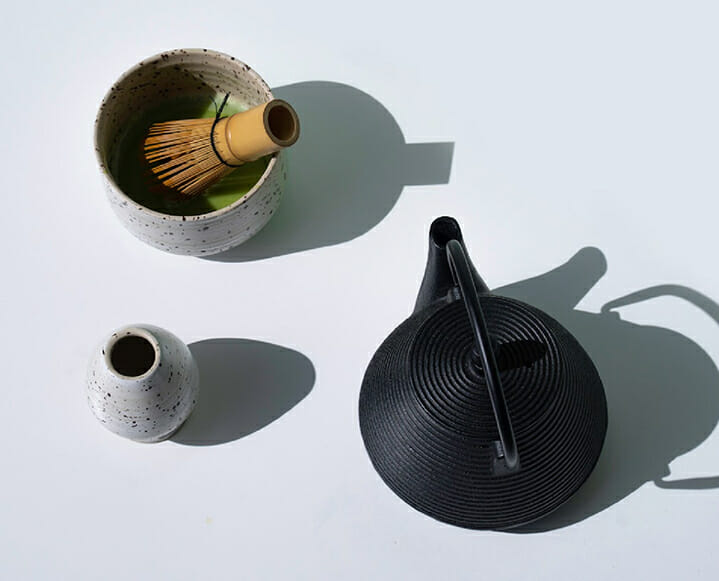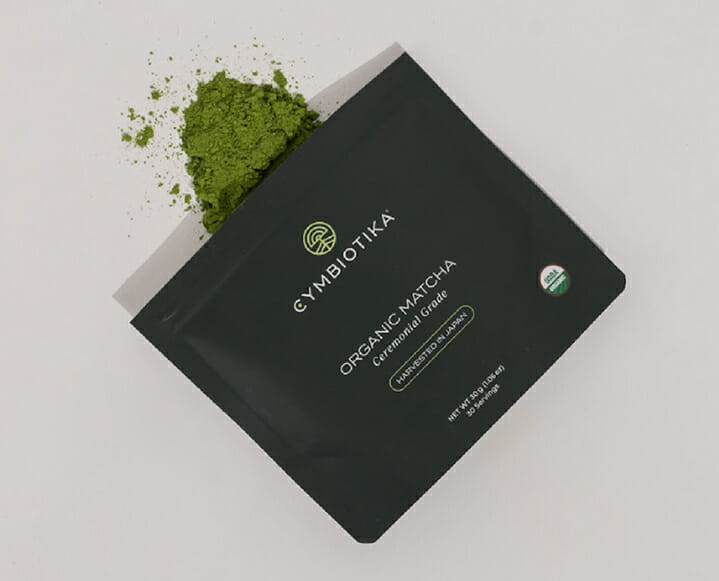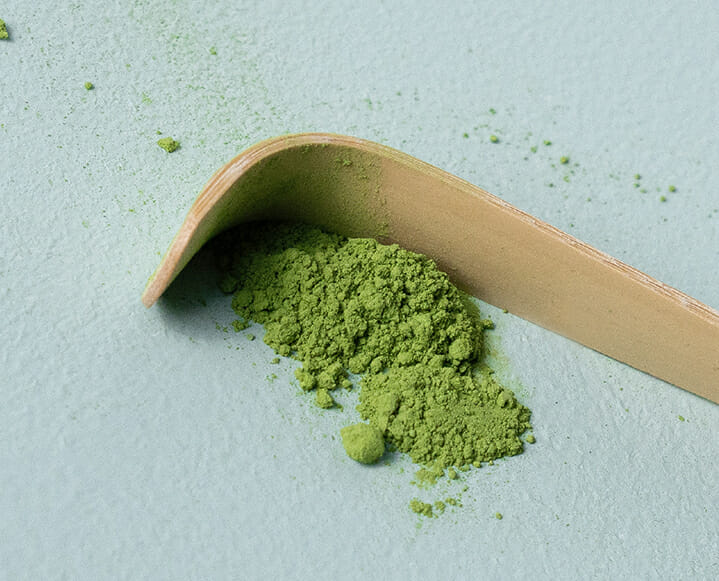IT SEEMS TO be an endless debate in wellness these days: coffee or matcha? We’ve all heard that exchanging our morning Americano or cold brew for a cup of bright green matcha could be a good idea. But is it really true?
While matcha is often perceived as a trendy LA wellness drink, the nutrient-dense green tea powder has been around for eons, dating back to the Tang Dynasty in China and playing a popular role in Japanese culture for over 800 years.
If you’re anything like me, you’re always on the hunt for an upgrade to your daily routines. A hot, energizing drink in the morning is a non-negotiable for me and, even though I hear a steady stream of bad press on coffee, the ritual and rhythm of my morning cup feels like a much-needed daily indulgence. There is something about my morning coffee ritual that feels sacred, and almost impossible to let go of.
So, does coffee really deserve its bad reputation? It’s complicated. For every negative piece of coffee press, there seems to be a positive one – and on. It all comes down to the impact of caffeine, and for many, matcha can provide a much more even effect. The truth is that a cup of coffee spikes cortisol levels in the morning when they’re already high and, for some, coffee can cause anxiety, disrupt sleep, and irritate your digestive system.
The Chalkboard is offering readers an exclusive 15% off to try Cymbiotika’s new ceremonial grade matcha for one week for themselves. Swap your coffee for matcha for 7 days and see how you feel!
Here’s Why Matcha Is Worth Considering
(Even For Coffee Lovers)
Maybe you’ve heard that matcha is rich in antioxidants and other beneficial compounds that help boost brain function, protect the liver, and may even help ward off cancer. The truth is that coffee shares many of those same benefits. It’s one special amino acid found in matcha that makes the switch so compelling.
I recently had my own lightbulb moment regarding matcha. In an attempt to hack my own rising levels of anxiety I decided to experiment by supplementing my coffee with L-Theanine. L-Theanine is non-protein amino acid that, when combined with caffeine, helps the caffeine metabolize slower in the body and soothes the central nervous system. By adding L-theanine to my coffee I noticed a remarkable improvement in my anxiety levels in the morning.
As it turns out, matcha already naturally contains L-Theanine – no supplement required!
The Calm Alertness I Feel with Matcha
Because matcha is a whole-leaf green tea, it is exceptionally high in L-theanine. Again, coffee beans contain zero.
The matcha “high” that so many love comes from that special combination of both L-Theanine and caffeine. As a fellow coffee drinker, I promise it’s worth exploring. The feeling is drastically different than my manic coffee buzz.
I’ve always thought that I needed the edge for energy, but perhaps it’s the wisdom of a little age that says, “Oh! The edge makes me edgy… not actually more focused.”
Here are a few more reasons why matcha makes the cut for my new morning routine and some science from Cymbiotika:
+ 10X THE ANTIOXIDANTS Unlike regular green tea, matcha is made from the whole plant, containing 10x the antioxidants of regular green tea!
+ JITTER-FREE FOCUS Improves focus and concentration. The combination of L-Theanine and caffeine helps the caffeine metabolize slower in the body and soothes the central nervous system.
+ SUPPORTS METABOLIC HEALTH Matcha is abundant in the catechin, ECGC, which has thermogenic effects on the body, boosting metabolism and supporting weight loss.
+ ANTI-INFLAMMATORY and good for joint health. ECGC is also known to reduce inflammation and protect against cell damage.
+ COMBATS PREMATURE AGING – rich in antioxidants that help protect the body from free radical damage. The high level of antioxidants helps increase anti-aging molecules and promote cellular regeneration.
+ ORAL HEALTH Matcha benefits our oral health. The literal opposite effect of coffee whose acid content can wear on tooth enamel!
Why You Need ‘Ceremonial Grade’ Matcha
The quality of matcha is quite varied. Just like everything else we shop these days, a little personal education is required to be sure we’re shopping wisely for foods that are pure, potent and high-quality.
Try Cymbiotika’s new ceremonial grade matcha for 15% off. I suggest that you swap your coffee for matcha for 7 days and see how you feel!
Cymbiotika is already a highly-trusted source for supplements, so I knew their matcha would be some of the best. Here’s what I’ve learned:
Cymbiotika‘s matcha is 100% organic and “Ceremonial grade”. The matcha is harvested from only the top leaves of each plant in small batches and a few weeks before harvest, the tea fields are shaded to reduce the production of tannins, preserve the highest chlorophyll content possible (read: neon green, nutrient-dense tea!), and increase the L-theanine and caffeine content.
Sourced from small family farms in the regions Uji and Kagoshima, the color alone is some of the most vibrant I’ve ever seen! The flavor is bright and creamy without the chalky bitterness of a few other matcha lattes I’ve tried. The Kagoshima region is known for producing Japan’s finest organic matcha, where the rich volcanic soils of this southern region of Japan imbue a nuanced flavor not possible to achieve in other soils.
Note that good matcha will always be a vibrant shade of green. If your matcha is yellowish or dull, it may be old, of a lower grade or, worse — stay away.
Coffee, Matcha – Or Both?
I’m not an all-or-nothing person, so coffee and matcha both find a place in my routine now. If you love coffee, but can’t imagine giving it up 100%, I understand that! You can still gain so many benefits from adding matcha to your routine. Here are a few ways that I recommend slowly incorporating matcha so you can feel the difference:
+ Save coffee for the weekends, and drink matcha during the week.
+ Go two weeks on matcha, and two weeks on coffee.
+ Swap your second cup of coffee for matcha. It’s ideal to swap your first cup of coffee for matcha as coffee on an empty stomach can mess with your digestion.
+ Don’t reach for an afternoon cold brew, try a matcha latte instead.
+ Save coffee for social settings (meetings, etc.).
Finally, How To Make the Perfect Matcha
Whip out your blender or electric whisk and combine ½ tsp (1g) of matcha powder with 6-8 ounces of water. Blend and enjoy your matcha alone or with a splash or your favorite milk.
Want to get traditional about it?
Add ½ tsp (1g) of matcha powder into a ceramic cup or ceremonial tea bowl.
Pour 1-2 ounces of hot water, mix with a bamboo whisk, and blend until smooth.
Slowly add an additional 4-6 ounces of hot water or your favorite milk, depending on the preferred strength.
Blend and enjoy!
Try The 7-Day Matcha Challenge!
Feeling inspired to make the swap and give matcha mornings a try? TCM readers can shop Cymbiotika’s ceremonial grade matcha for 15% off for a limited time. Shop the full site at this price, plus get free shipping with code CHALKBOARD. Make the switch from coffee to matcha for one week and see how you feel. Be sure to leave a comment and let us know how it went!
This story is brought to you in partnership with Cymbiotika. From time to time, TCM editors choose to partner with brands we believe in to bring our readers special offers. All material on The Chalkboard Mag is provided for educational purposes only. Always seek the advice of your physician or another qualified healthcare provider for any questions you have regarding a medical condition, and before undertaking any diet, exercise or other health-related programs.


